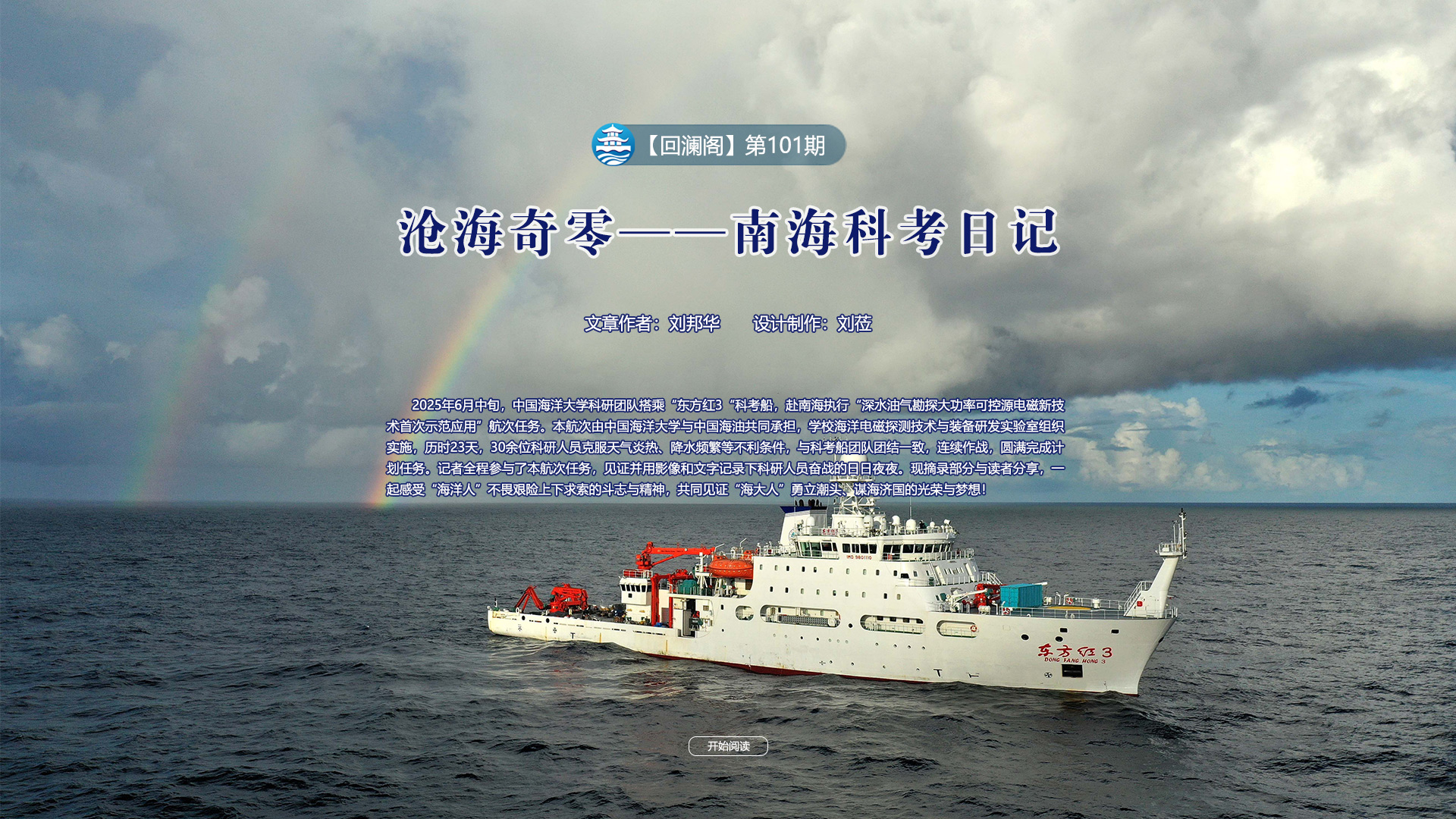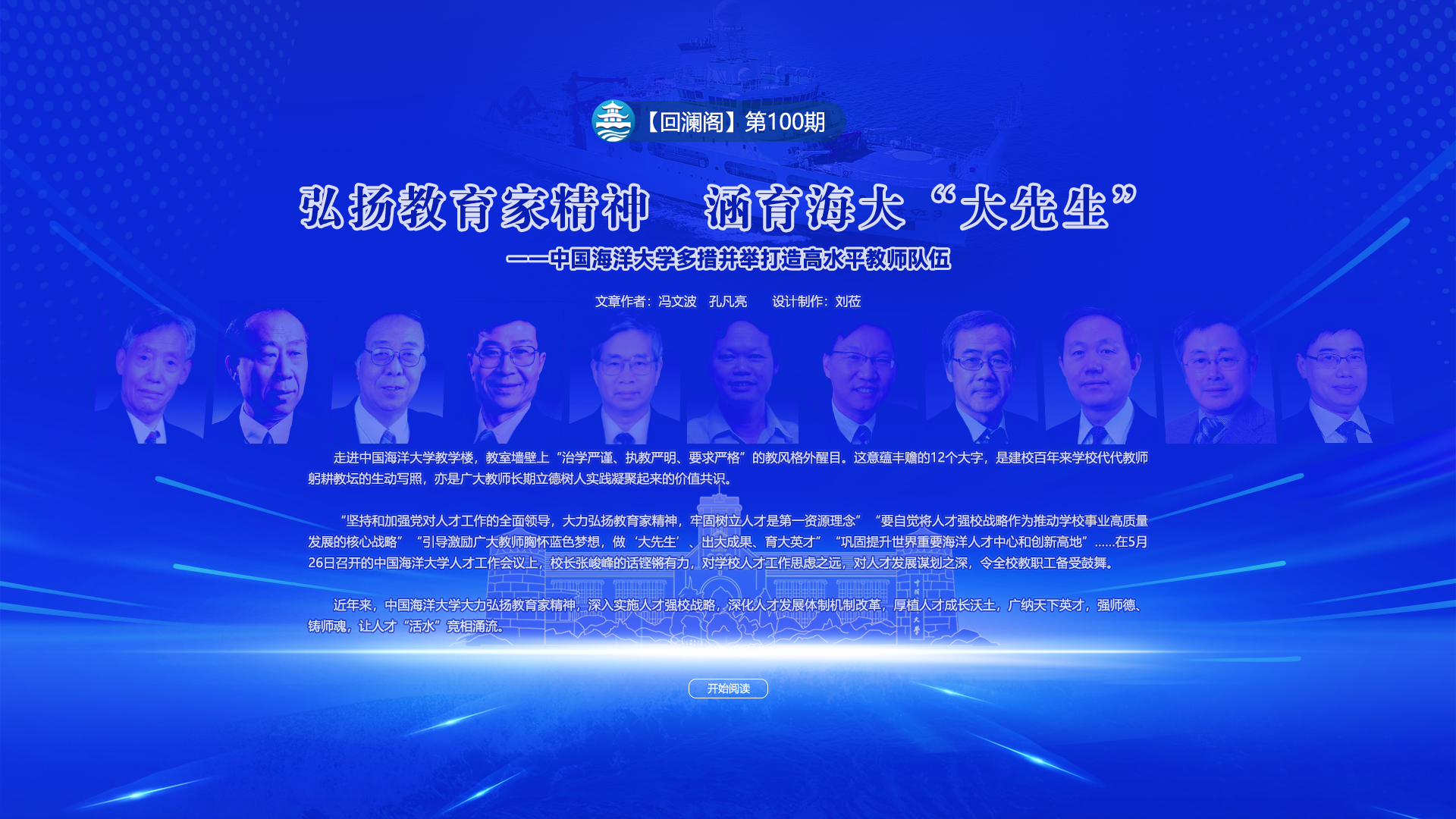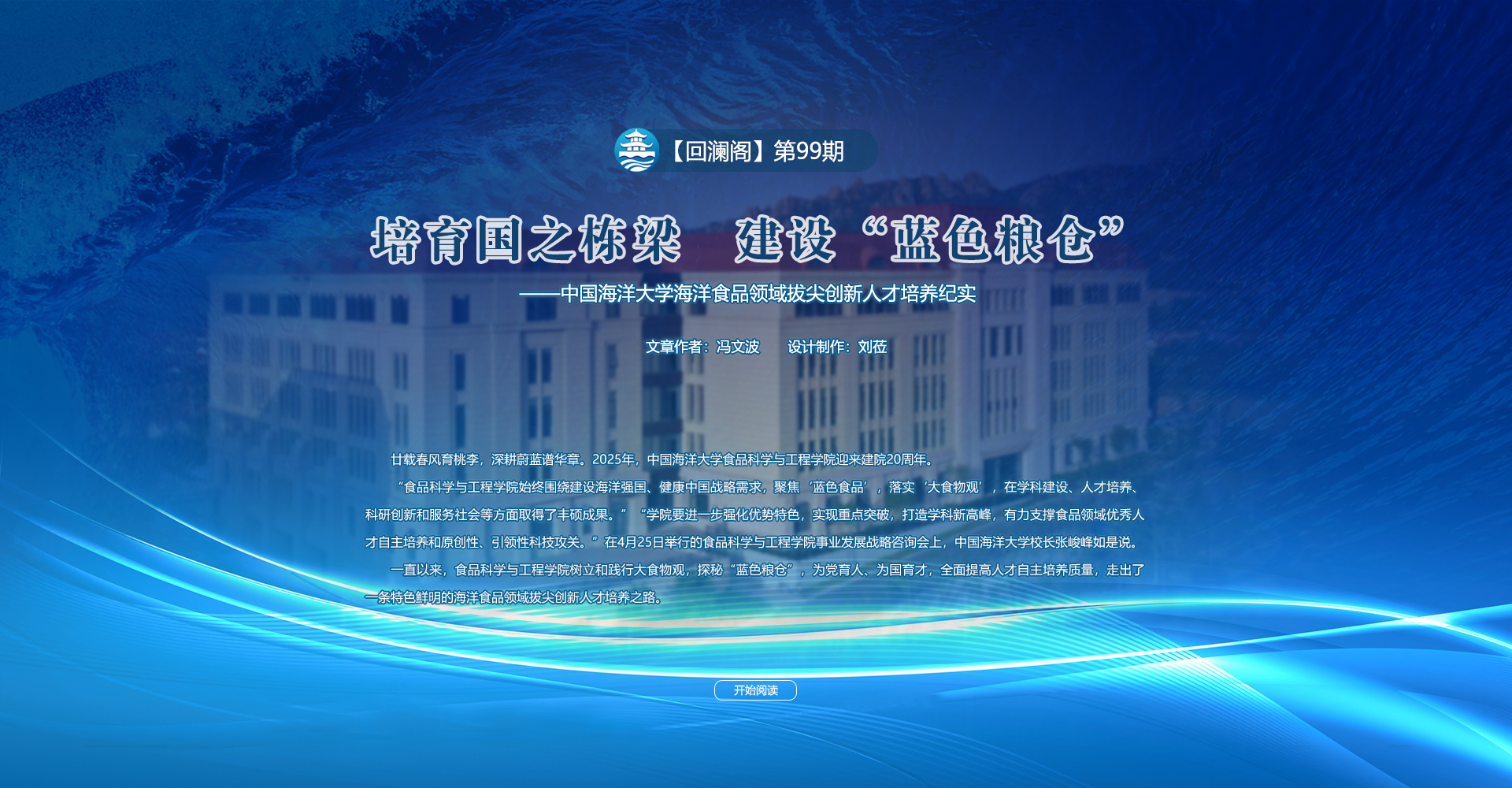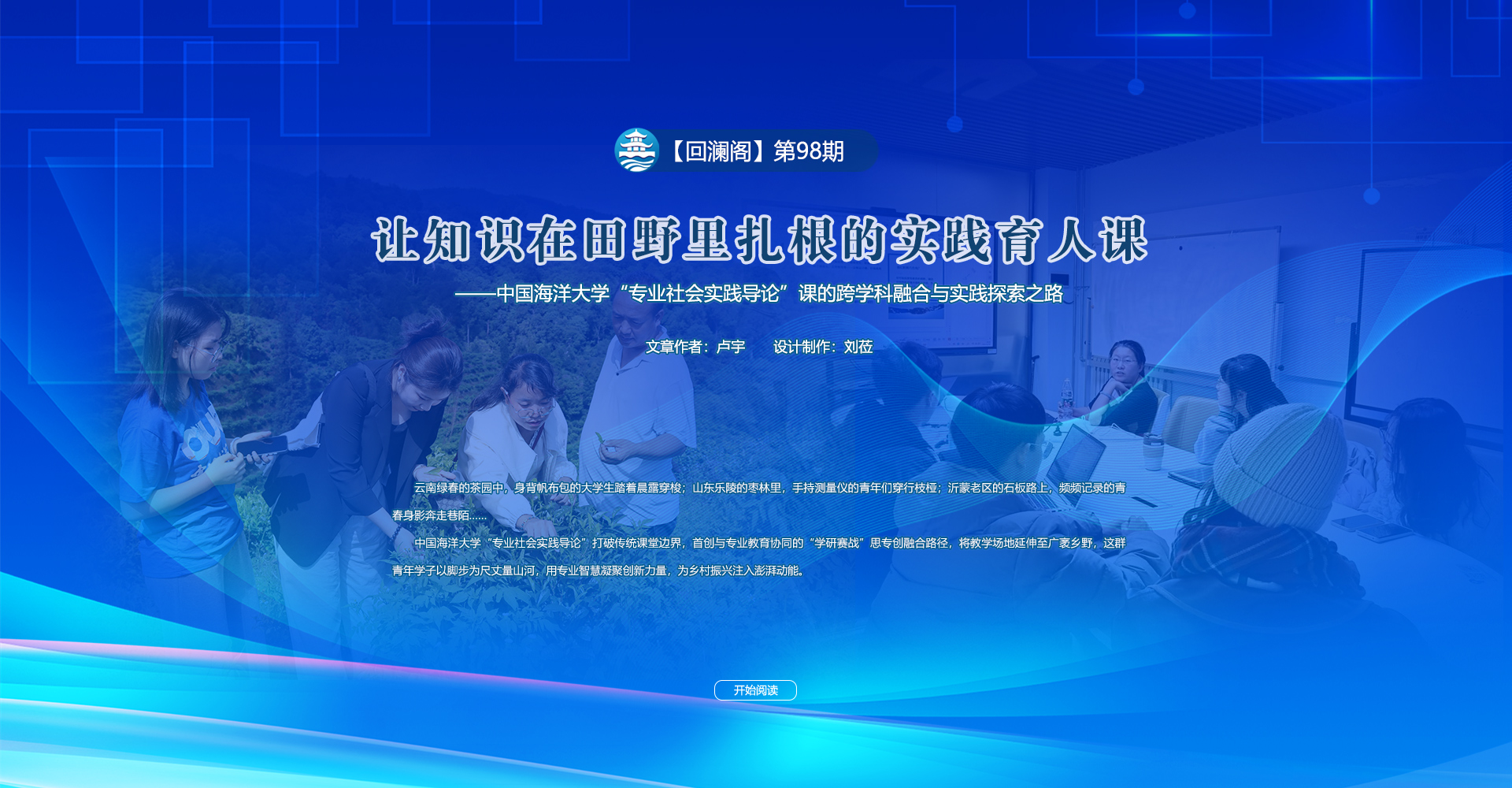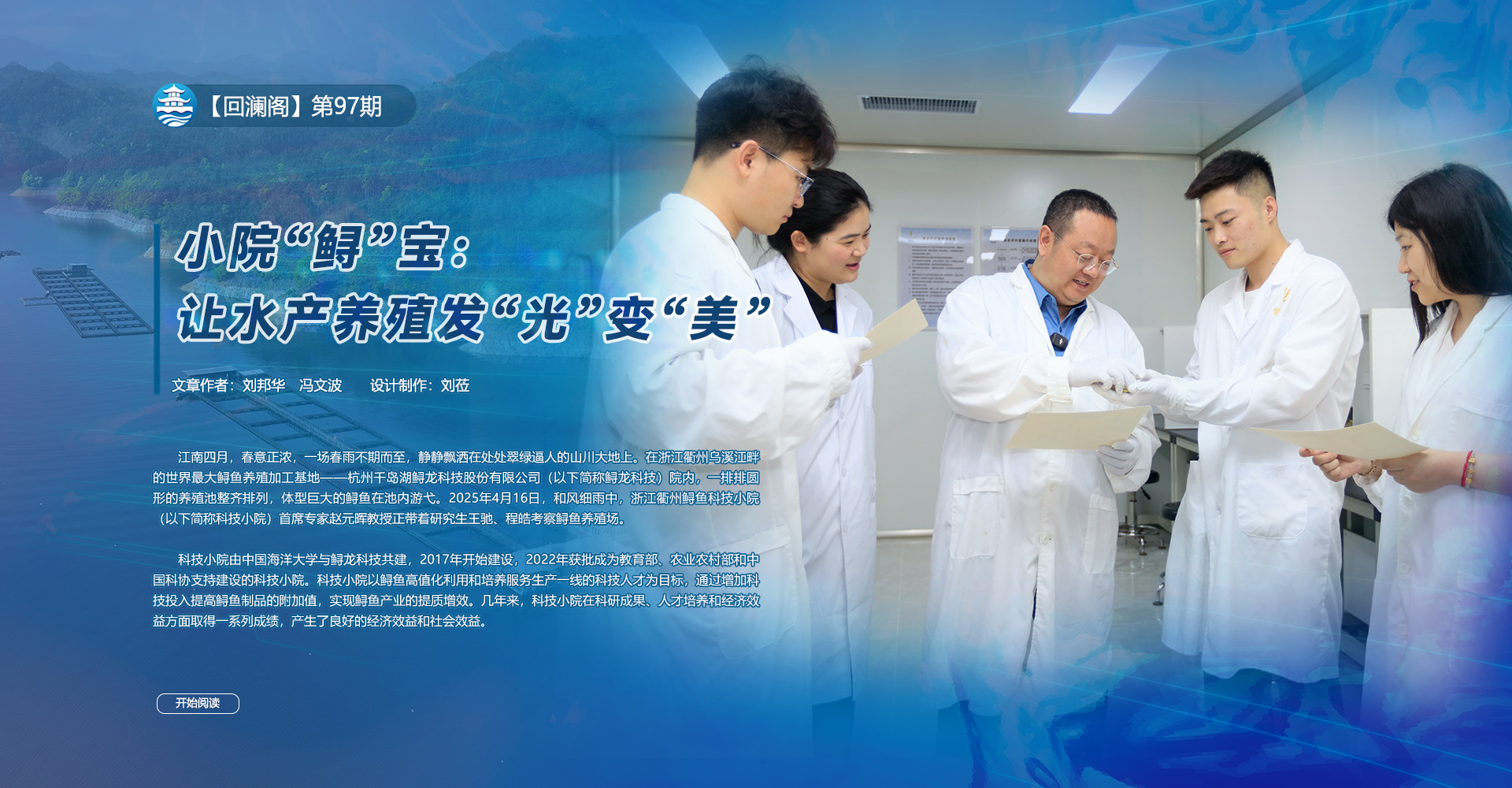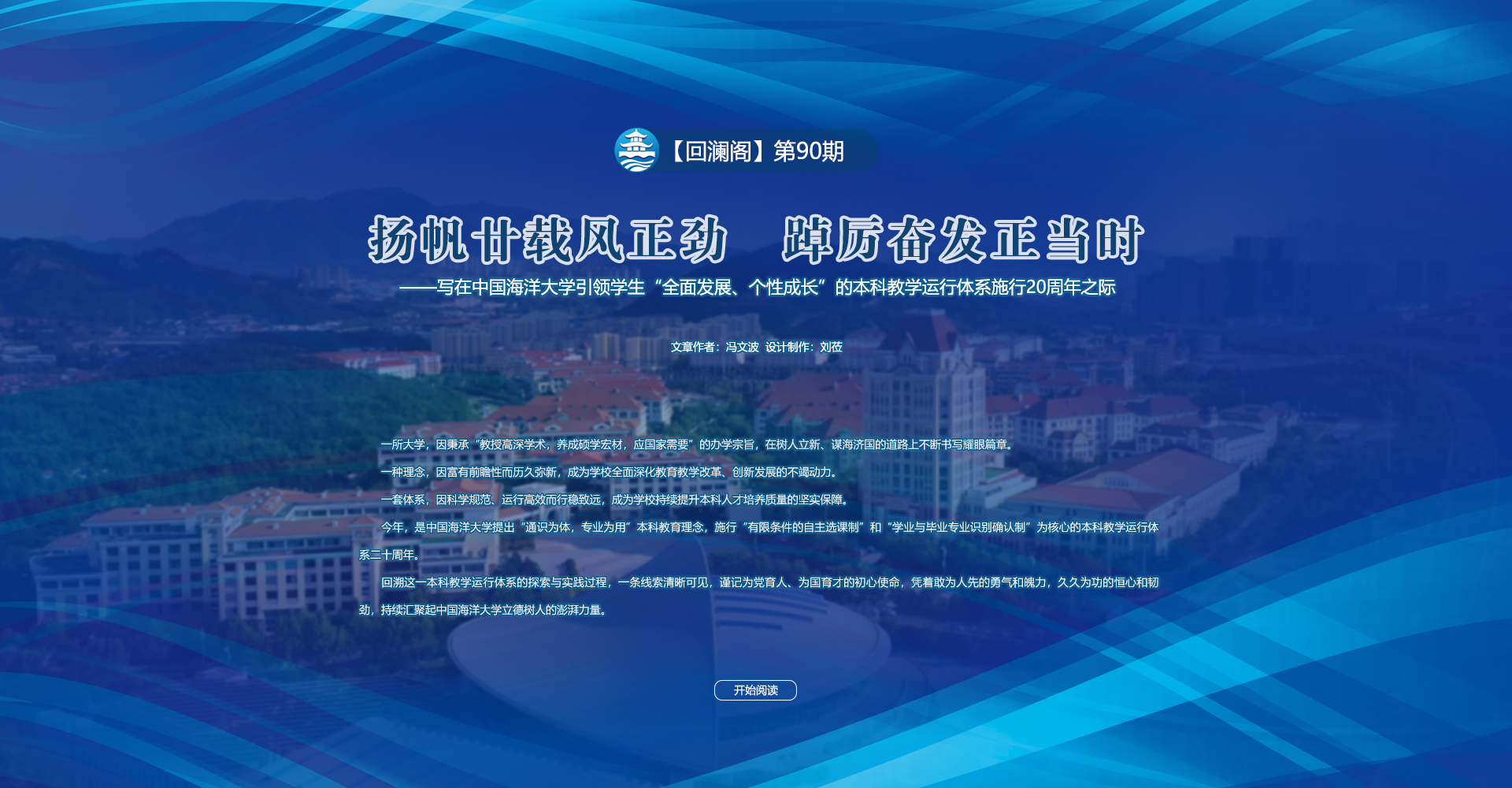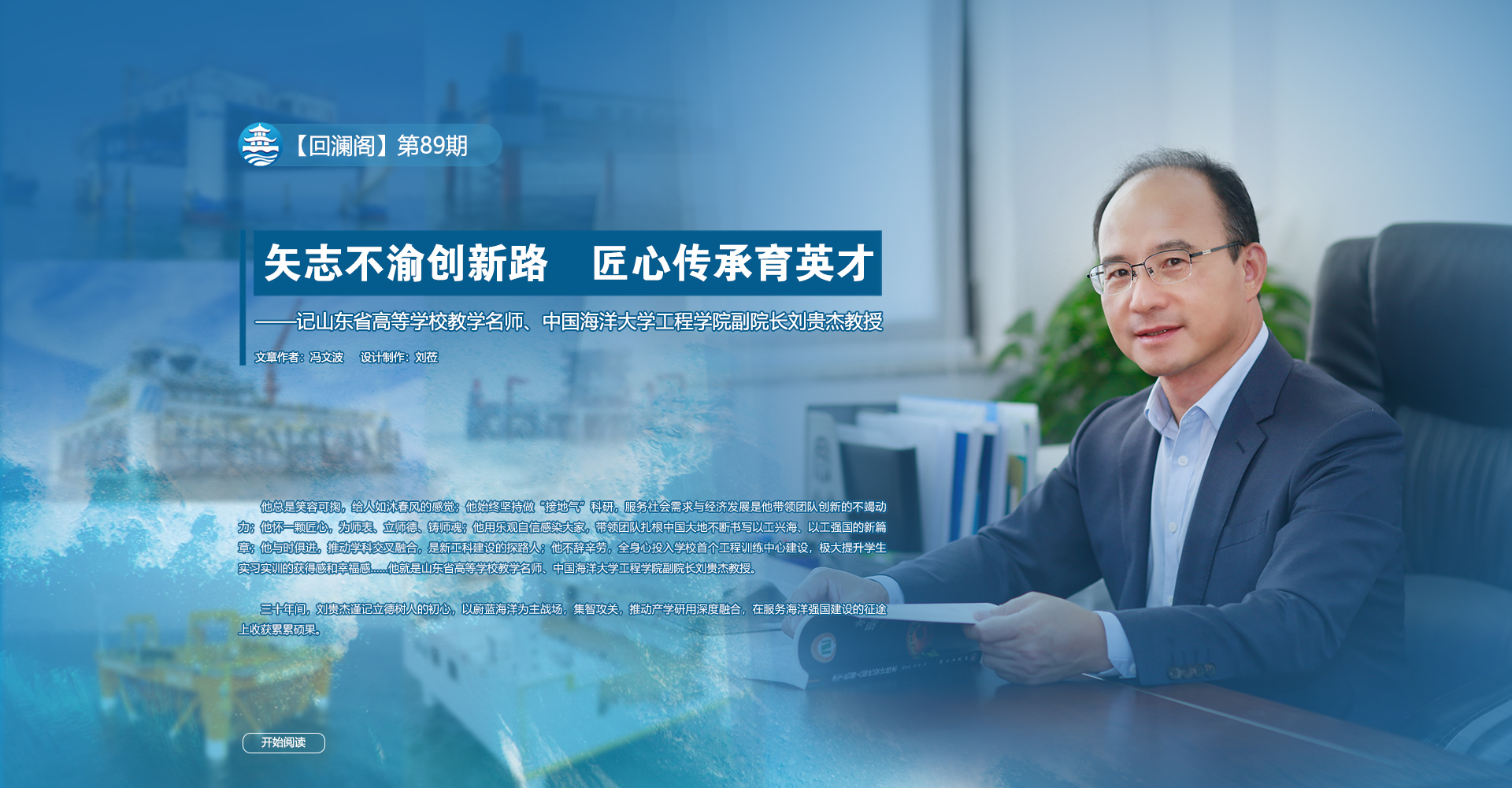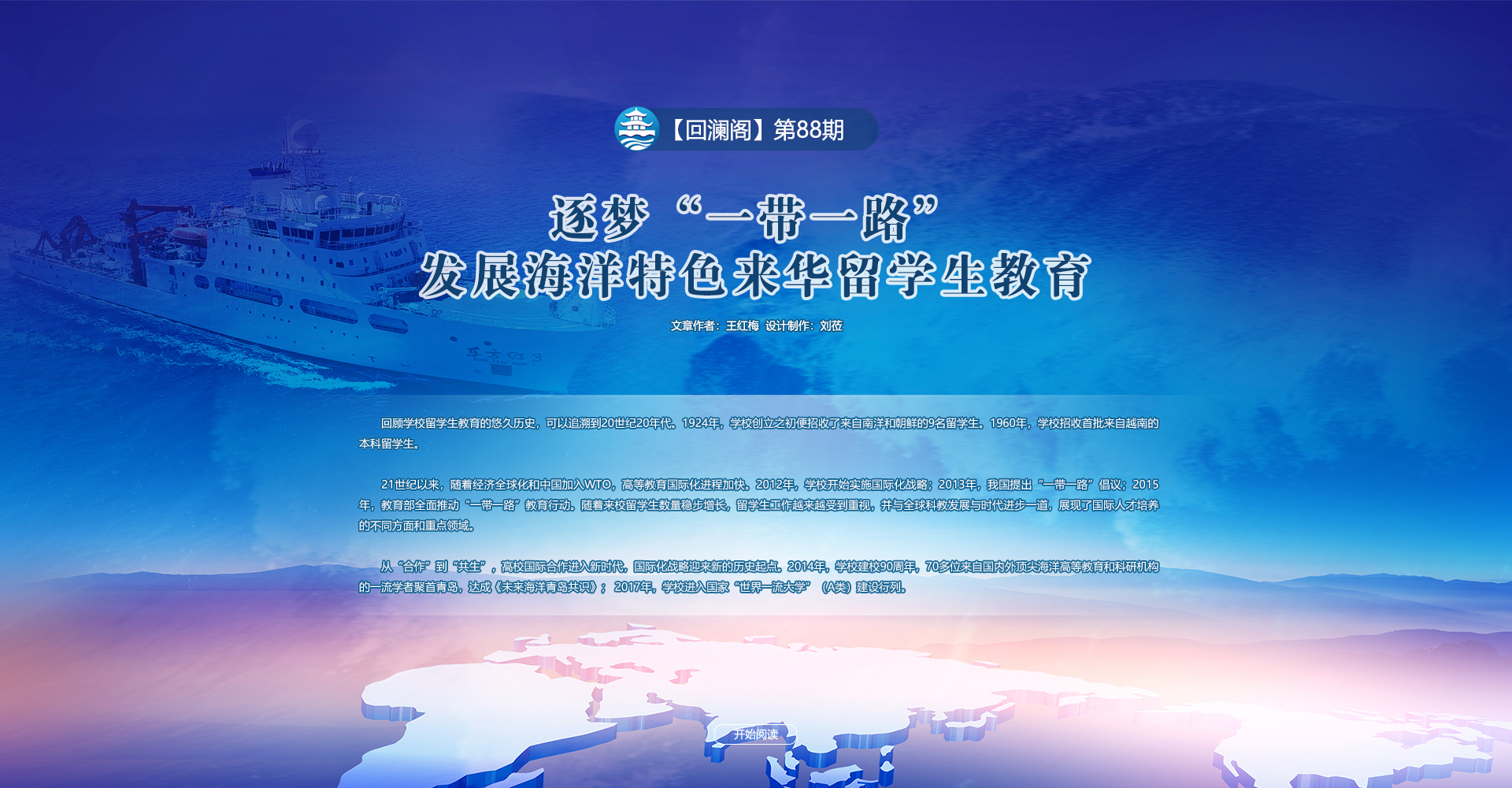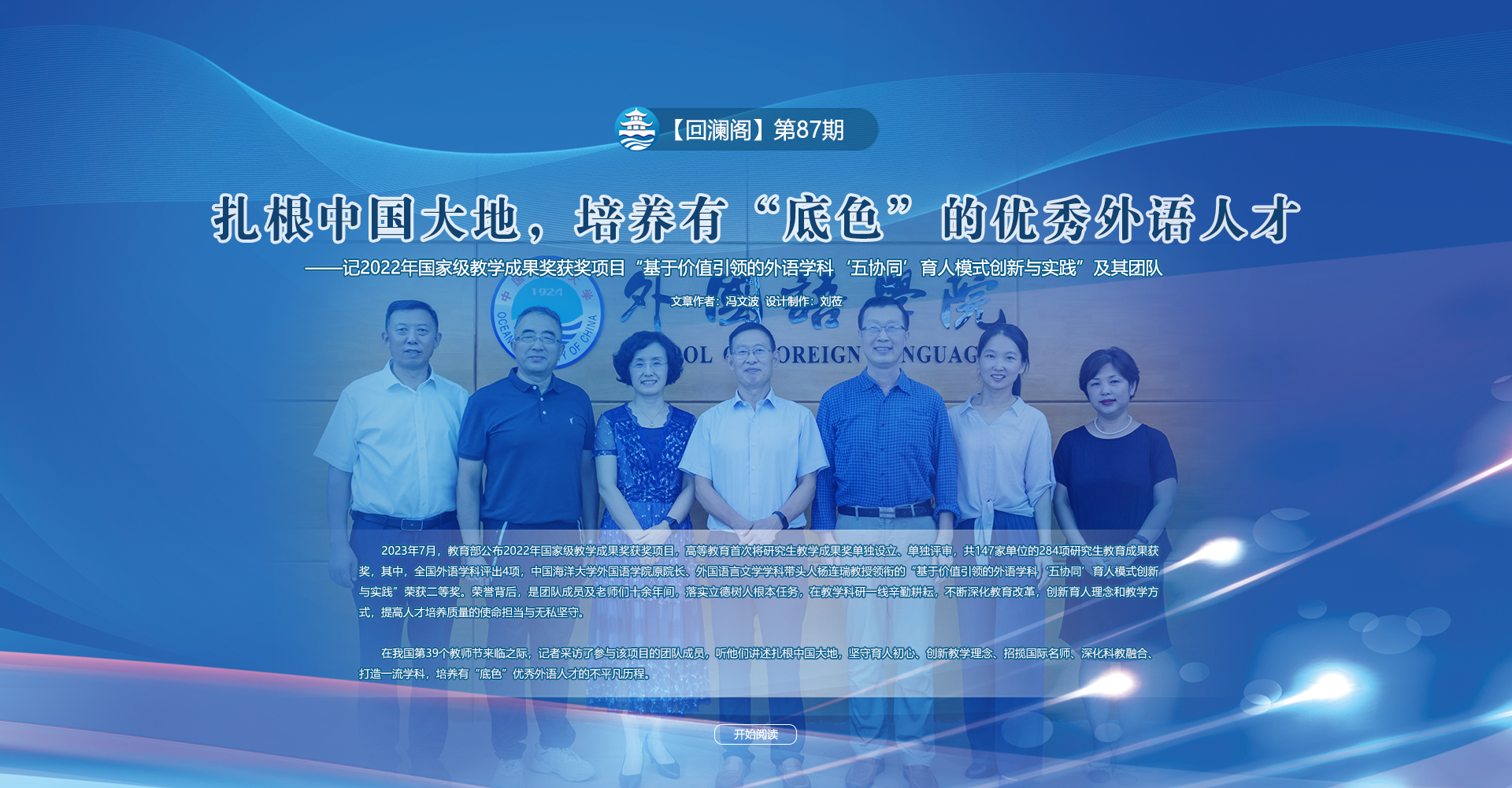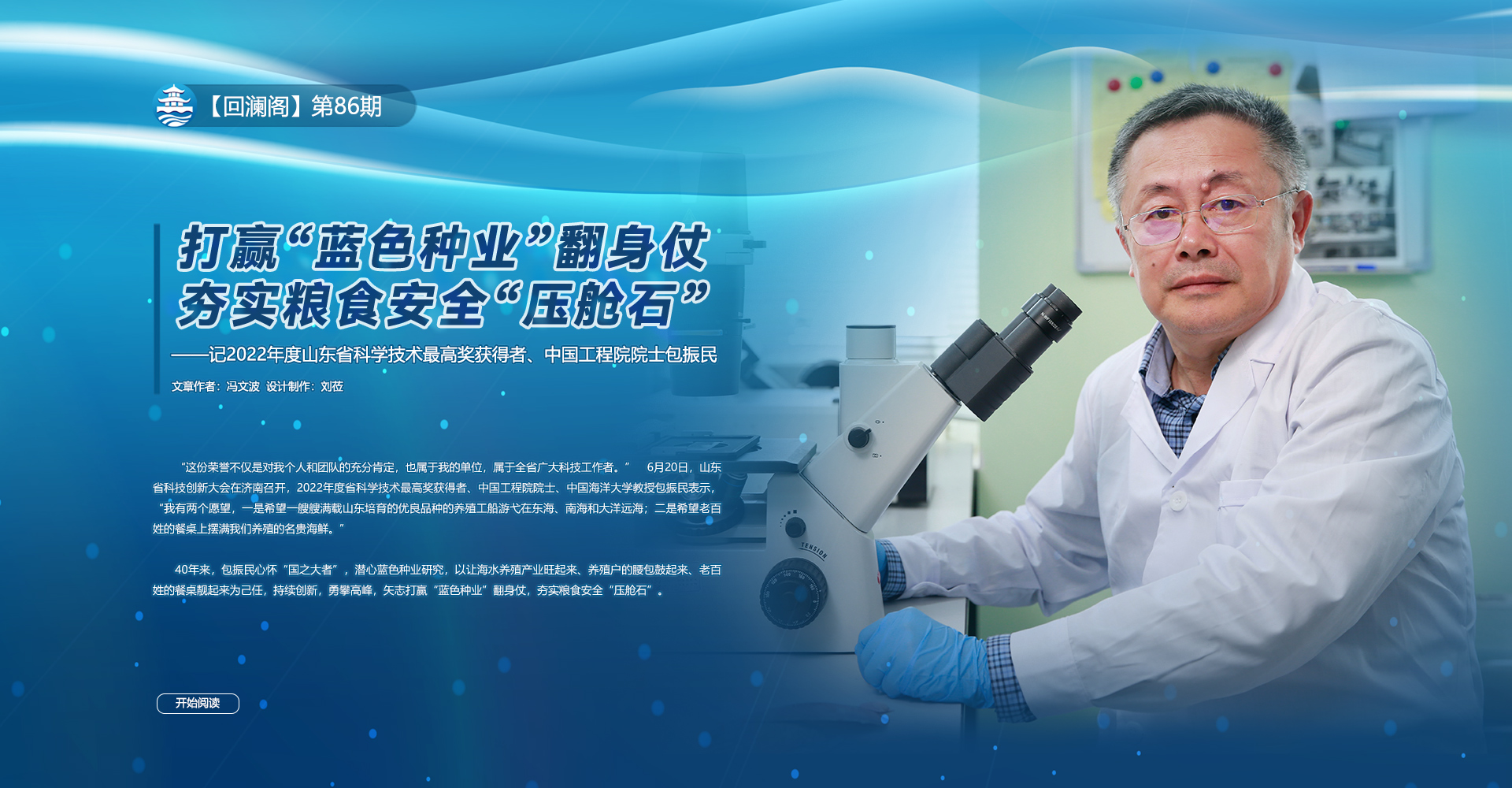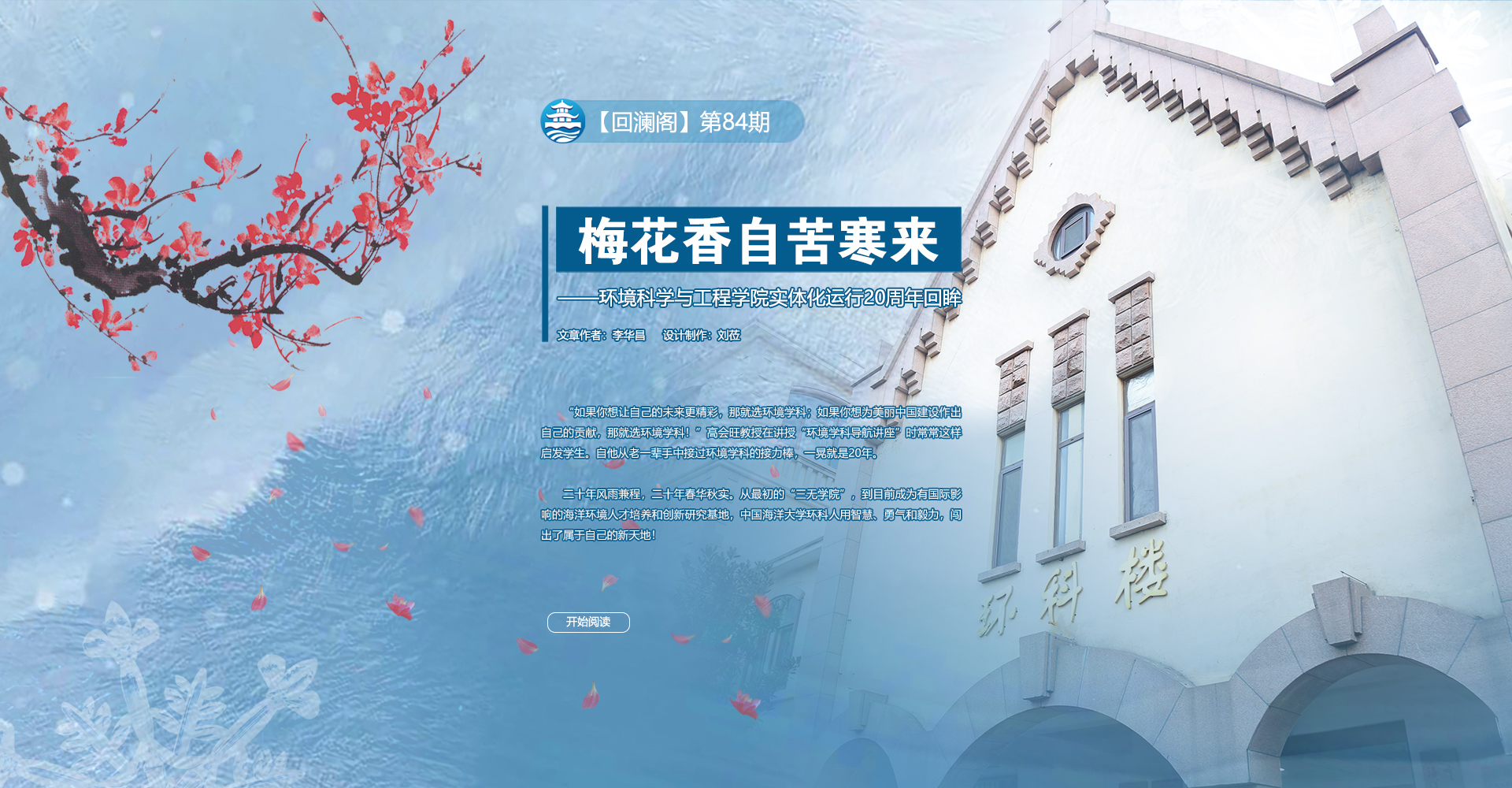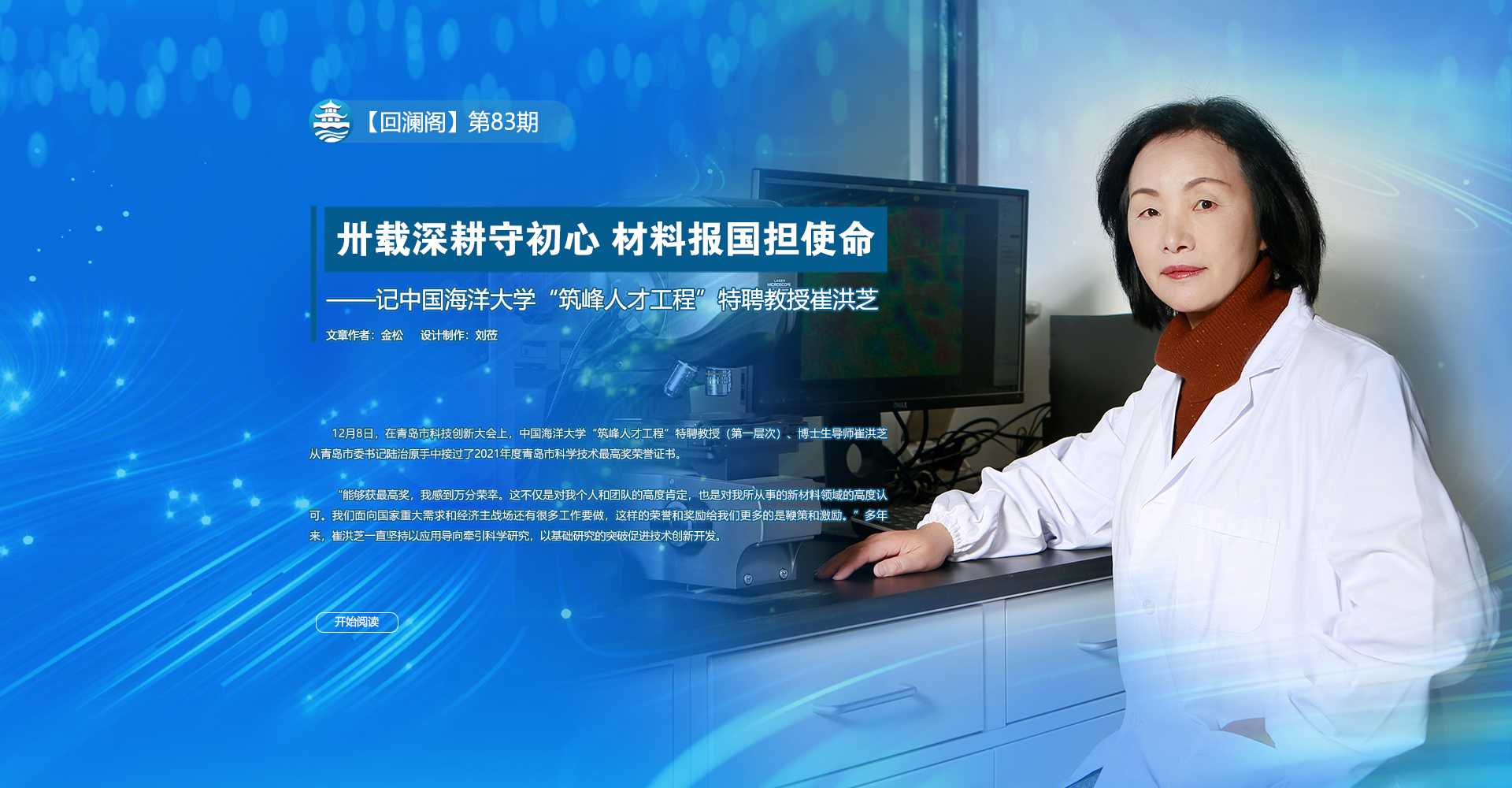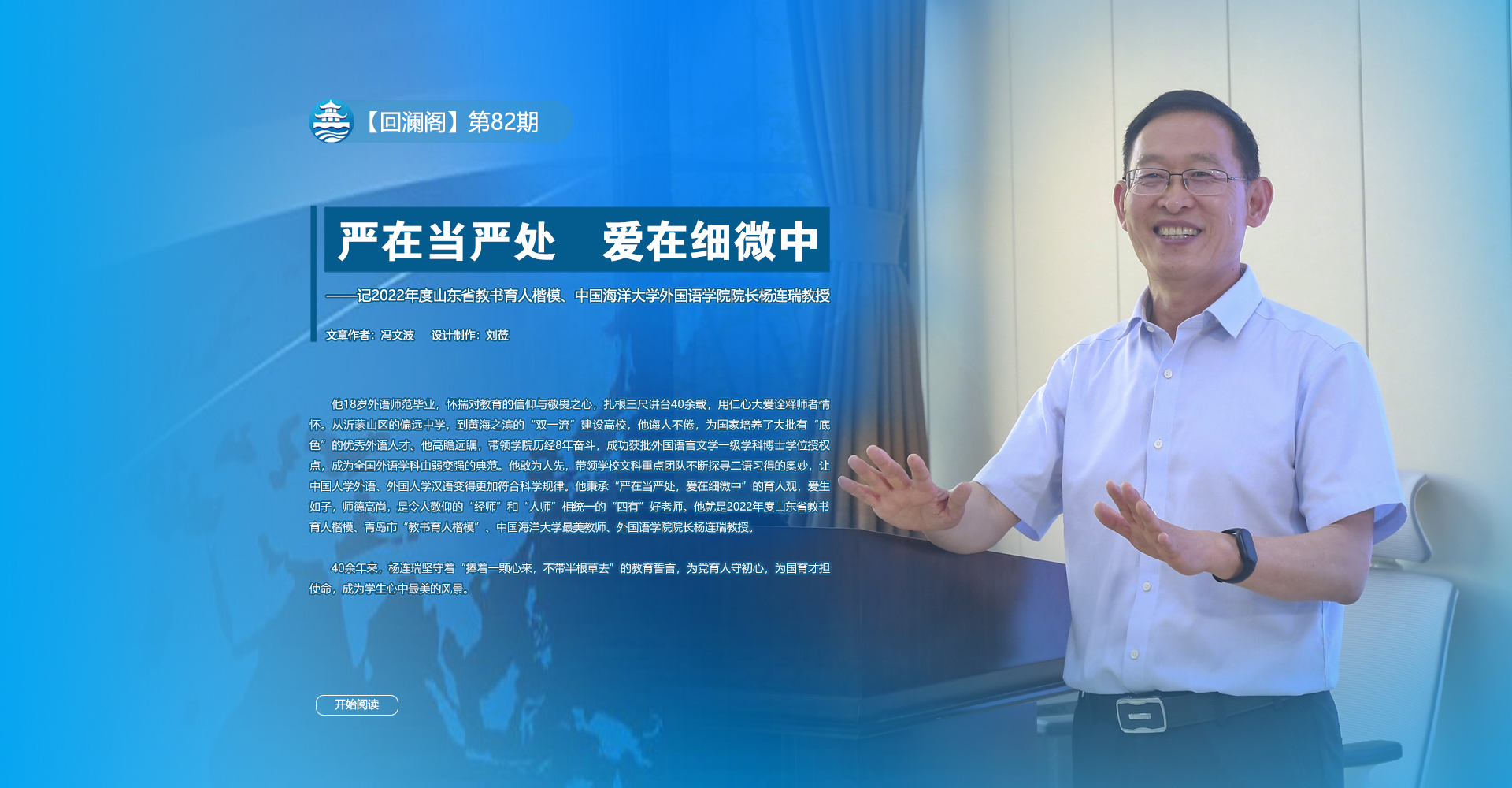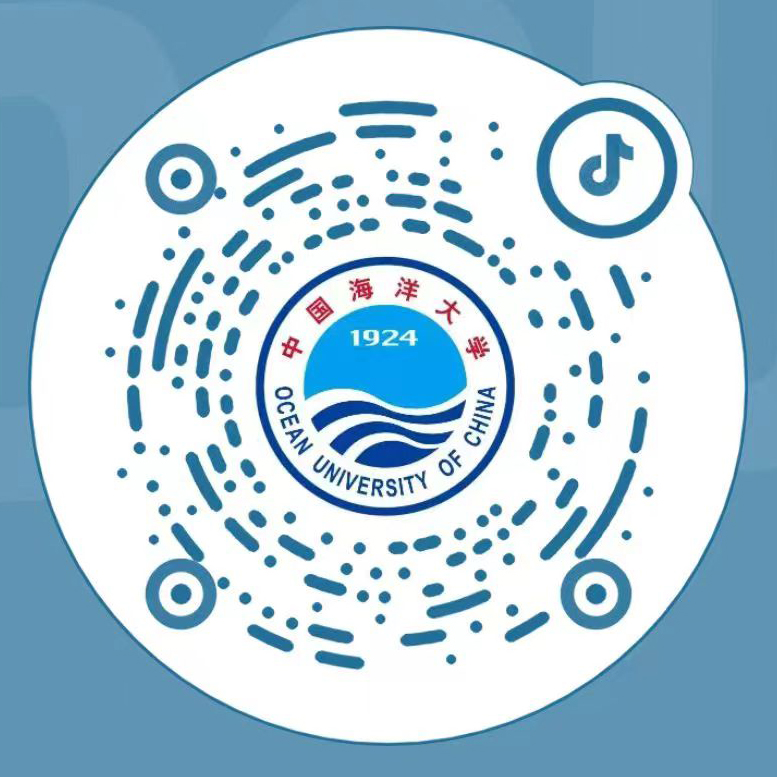【编者按】中国海洋大学在百年的发展历程中,坚持开放办学,始终引领我国海洋科教事业创新发展,为国家海洋事业兴盛、促进全球海洋科教合作作出了重要历史贡献。近年来,学校贯彻落实新时期教育对外开放要求,充分发挥海洋、水产综合优势,积极服务国家外交大局、“一带一路”建设和海洋命运共同体构建,深入推进国际化战略实施,深化与世界一流涉海院所机构交流合作,构建全球海洋科教协同创新合作平台与网络,打造开放合作新格局,助力特色显著的世界一流大学建设和高质量内涵发展。学校在海洋科教领域的国际知名度和竞争力显著提升,为加快建设世界重要海洋人才中心和创新高地,推动构建海洋命运共同体不断作出新的更大贡献。2024年10月17日出版的CHINA DAILY以"Century of progress fuels OUC's future outlook"(《海大百年弦歌不辍 开放合作共创未来》)为题,全面报道了学校实施“国际化战略”取得的成绩,全文内容如下:
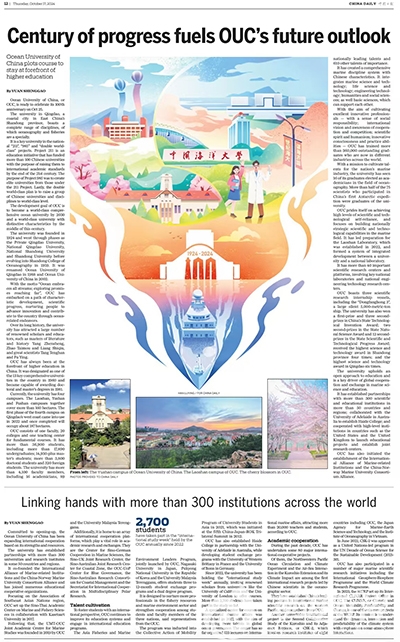
2024年10月17日 CHINA DAILY
Ocean University of China plots course to stay at forefront of higher education
Ocean University of China, or OUC, is ready to celebrate its 100th anniversary on Oct 25.
The university in Qingdao, a coastal city in East China's Shandong province, boasts a complete range of disciplines, of which oceanography and fisheries are a specialty.
It is a key university in the national 211, 985 and double world-class projects. Project 211 is an education initiative that has funded more than 100 Chinese universities with the purpose of raising them to international academic standards by the end of the 21st century. The purpose of Project 985 was to create elite universities from those under the 211 Project. Lastly, the double world-class plan is to raise a group of Chinese universities and disciplines to world-class level.
The development goal of OUC is to become a world-class comprehensive ocean university by 2030 and a world-class university with distinctive characteristics by the middle of this century.
The university was founded in 1924 and went through phases as the Private Qingdao University, National Qingdao University, National Shandong University and Shandong University before evolving into Shandong College of Oceanography in 1959. It was renamed Ocean University of Qingdao in 1988 and Ocean University of China in 2002.
With the motto Ocean embraces all streams; exploring promises reaching far, OUC has embarked on a path of characteristic development, scientific progress, nurturing people to advance innovation and contribute to the country through ocean-related endeavors.
Over its long history, the university has attracted a large number of renowned scholars and educators, such as masters of literature and history Yang Zhensheng, Zhao Taimou and Liang Shiqiu, and great scientists Tang Tenghan and Fu Ying.
OUC has always been at the forefront of higher education in China. It was designated as one of the 13 key comprehensive universities in the country in 1960 and became capable of awarding doctoral and master's degrees in 1981.
Currently, the university has four campuses. The Laoshan, Yushan and Fushan campuses together cover more than 160 hectares. The first phase of the fourth campus on Qingdao's west coast came into use in 2022 and once completed will occupy about 187 hectares.
OUC consists of one faculty, 20 colleges and one teaching center for fundamental courses. It has more than 36,900 students, including more than 17,890 undergraduates; 14,950-plus master's students; more than 3,800 doctoral students and 320 foreign students. The university has more than 4,100 faculty members, including 16 academicians, 89 nationally leading talents and 610 other talents of importance.
It has created a comprehensive marine discipline system with Chinese characteristics. It integrates marine science and technology; life science and technology; engineering technology; humanities and social sciences; as well basic sciences, which can support each other.
With the aim of cultivating excellent innovative professionals — with a sense of social responsibility; international vision and awareness of cooperation and competition; scientific spirit and humanism; innovative consciousness and practice abilities — OUC has trained more than 360,000 outstanding graduates who are now in different industries across the world.
With a mission to cultivate talents for the nation's marine industry, the university has seen 16 of its graduates elected as academicians in the field of oceanography. More than half of the 75 scientists who participated in China's first Antarctic expedition were graduates of the university.
OUC prides itself on achieving high levels of scientific and technological self-reliance, and focuses on building nationally strategic scientific and technological capabilities in the marine field. It has led preparation for the Laoshan Laboratory, which was established in 2022, and formed a system of integrated development between a university and a national laboratory.
It has more than 40 important scientific research centers and platforms, involving key national laboratories and national engineering technology research centers.
OUC boasts three scientific research internship vessels, including the Dongfanghong 3, a large silent 5,000-metric-ton ship. The university has also won a first-prize and three second-prizes in China's State Technological Invention Award; two second-prizes in the State Natural Science Award and 12 second-prizes in the State Scientific and Technological Progress Award; received the highest science and technology award in Shandong province four times; and the highest science and technology award in Qingdao six times.
The university upholds an open approach to education and is a key driver of global cooperation and exchange in marine science and education.
It has established partnerships with more than 300 scientific and educational institutions in more than 50 countries and regions; collaborated with the University of Adelaide in Australia to establish Haide College; and cooperated with high-level institutions in countries such as the United States and the United Kingdom to launch educational projects and establish joint research centers.
OUC has also initiated the establishment of the International Alliance of Marine-related Institutions and the China-Norway Marine University Consortium Alliance.
Linking hands with more than 300 institutions across the world
Committed to opening-up, the Ocean University of China has been expanding international cooperation based on its strengths and resources.
The university has established partnerships with more than 300 universities and research institutes in some 50 countries and regions.
It co-founded the International Alliance of Marine-related Institutions and the China-Norway Marine University Consortium Alliance and has joined numerous educational cooperative organizations.
Focusing on the Association of Southeast Asian Nations region, OUC set up the Sino-Thai Academic Center on Marine and Fishery Sciences in collaboration with Kasetsart University in 2017.
Following that, the UMT-OUC Joint Academic Centre for Marine Studies was founded in 2019 by OUC and the University Malaysia Terengganu.
Additionally, it is home to an array of international cooperation platforms, which play a vital role in academic research and exchanges. They are the Center for Sino-German Cooperation in Marine Sciences, the Sino-UK Joint Research Center, the Sino-Australian Joint Research Center for Coastal Zone, the OUC-UoP Center for Blue Governance, the Sino-Australian Research Consortium for Coastal Management and the Secretariat for International Cooperation in Multidisciplinary Polar Research.
Talent cultivation
To foster students with an international perspective, OUC continues to improve its education systems and engage in international education programs.
The Asia Fisheries and Marine Environment Leaders Program, jointly launched by OUC, Nagasaki University in Japan, Pukyong National University in the Republic of Korea and the University Malaysia Terengganu, offers students three to 12-month student exchange programs and a dual degree program.
It is designed to nurture more professionals in the fishery resources and marine environment sector and strengthen cooperation among students and faculty members of the three nations, said representatives from the OUC.
The program was inducted into the Collective Action of Mobility Program of University Students in Asia in 2021, which was initiated at the fifth China-Japan-ROK Trilateral Summit in 2012.
OUC has also established Haide College in partnership with the University of Adelaide in Australia, while developing student exchange programs with the University of Western Brittany in France and the University of Bonn in Germany.
Since 2022, the university has been holding the international study week annually, inviting renowned scholars from universities like the University of California and the University of London to offer courses. More than 2,700 students have taken part in the study so far.
A specialized center for courses on international marine affairs was established in 2017, with the aim of developing more talents in global ocean governance. The center has so far organized 123 lectures on international marine affairs, attracting more than 20,000 teachers and students, according to OUC.
Academic cooperation
During the past decade, OUC has undertaken some 80 major international cooperative projects.
Of them, the Northwestern Pacific Ocean Circulation and Climate Experiment and the Air-Sea Interaction in the Kuroshio Extension and its Climate Impact are among the first international research projects led by Chinese scientists in the oceanographic sector.
They have established China's leading position in international marine scientific research on the western Pacific, said researchers from OUC.
Another remarkable international project is the Second Collaborative Study of the Kuroshio and its Adjacent Regions, or CSK-2, which involves research institutes of eight countries including OUC, the Japan Agency for Marine-Earth Science and Technology, and the Institute of Oceanography in Vietnam.
In June 2022, CSK-2 was approved as a United Nations-led program in the UN Decade of Ocean Science for Sustainable Development (2021-2030).
OUC has also participated in a number of major marine scientific research initiatives including the International Geosphere-Biosphere Programme and the World Climate Research Programme.
In 2023, the WCRP set up its International CLIVAR Project Office in OUC. The CLIVAR, or Climate and Ocean: Variability, Predictability and Change, is one of the six core projects of the WCRP. Its mission is to understand the dynamics, interaction and predictability of the climate system with emphasis on ocean-atmosphere interactions.
新闻链接:【CHINA DAILY】Century of progress fuels OUC's future outlook
编辑:左伟
责任编辑:李华昌




